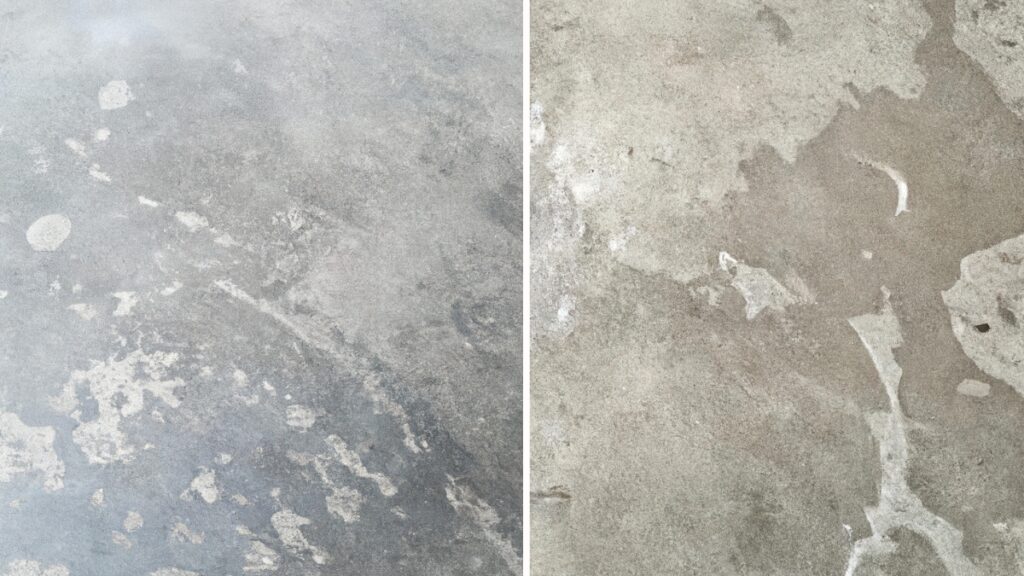Concrete floors in homes and industrial areas sometimes have this weird thing where they look like they’re sweating.
You might have seen this and wondered why your floor suddenly seems wet when no one spilled anything.
In this guide we’ll discuss why your concrete floor is sweating and provide you with possible solutions.
Let’s dive in!

Why Does Concrete Floor Sweat
Concrete floors sweat due to the process of condensation. This occurs when warm, moist air comes into contact with the cooler concrete surface, causing the moisture in the air to condense into liquid water on the floor.
1. Dew Point
The primary cause of concrete sweating is the difference in temperature between the warm, moist air and the cool concrete slab.
Imagine a cold soda can taken out of the fridge on a hot day. Soon, you notice water droplets forming on the outside.
This happens because the warm air around the cold can cools down when it touches the can’s surface.
When air cools down, it can’t hold as much moisture, so the moisture turns into water droplets.
Now, think of the concrete floor as the cold soda can. When warm, moist air comes into a room with a cooler concrete floor, the same thing happens.
The air near the floor cools down because the floor is cooler than the air. If the floor is cool enough, the moisture in the air turns into water droplets on the floor.
The “dew point” is a temperature that tells us when this will happen. It’s the temperature at which air needs to cool down to start turning moisture into water droplets.
If the concrete floor’s temperature is at or below this dew point, the moisture in the air will condense on the floor, making it look like it’s sweating.
2. Wet Adjacent Soil
This means if the soil next to a concrete structure, like a wall or floor, is very wet, moisture from the soil can move into the concrete.
Concrete, even though it seems very solid, has tiny channels inside it that can let water move through.
So, if the soil on one side of a concrete wall is wet, water can travel through these channels and come out on the other side of the wall, making the concrete surface wet.
This situation gets more noticeable if the air above the concrete is warmer.
Warm air can hold more moisture, and as it comes in contact with the concrete surface, it can cause the moisture from the soil that has moved into the concrete.
This process leaves the surface of the concrete wet, which is what we see as “sweating.”

3. Salts Deposits
Salts attract moisture from the air due to their hygroscopic nature. This moisture can come from the air or from within the concrete itself.
Here’s what happens: the ground has natural salts in it. When moisture from the ground rises up into the concrete, it brings these salts along.
Once the moisture reaches the surface and evaporates into the air, it leaves the salts behind.
These salt residues can then attract more moisture from the air, especially on humid days, making the floor look wet or “sweaty.”
4. Density of Concrete Slab
The term simply means how much matter, or stuff, is packed into a certain area of the concrete slab.
Imagine trying to pack as many sugar cubes as you can into a small box; the more cubes you can fit, the higher the density.
When it comes to concrete floors, those that are denser (or have more stuff packed tightly together) can affect how much the floor sweats.
A denser concrete slab doesn’t allow moisture to pass through it as easily as a less dense slab might.
Therefore, when the warm, moist air hits the cooler surface of a dense concrete floor, the moisture in the air turns into water droplets on the floor.
This is one of the reasons you might notice your concrete floor seems to be sweating.
Get Free Estimate: Concrete Patio Buffalo, NY
5. Cleanliness of Concrete Slab
The cleanliness significantly influences the phenomenon of floor sweating. When a concrete floor is clean, the surface will be free from dust, debris, oils, or any foreign substances that might trap moisture.
A clean floor allows the concrete to breathe better, reducing the likelihood of moisture accumulation on the surface.
This is crucial because when there is excessive moisture or humidity in the air, a dirty or oily concrete floor will tend to hold onto that moisture longer.
Regular cleaning and maintenance are essential steps to minimize sweating, ensuring the surface remains dry and less prone to slipping hazards.
How to fix concrete sweating
Concrete sweating can create a slippery surface and may indicate an underlying issue with humidity and temperature differences between the concrete and its environment.
Here is how you can fix concrete sweating:
Firstly, increase air circulation around the affected area. Use fans or install permanent ventilation systems to help reduce humidity levels and dry out the moisture.
In enclosed spaces, a dehumidifier can help reduce the moisture in the air. This can be particularly effective in basements or garages where the problem is common.
On the other hand, concrete sealers can prevent moisture from coming up through the concrete by creating a barrier.
You should also ensure the surface is clean and dry before applying the sealer for it to adhere properly.
This solution works by penetrating the concrete and reacting chemically to create a harder, denser surface.
This can help in reducing the pore size of the concrete, making it less prone to sweating.
Sometimes, the issue comes from high moisture content in the ground. Ensure proper drainage around your property to prevent water from sitting near the foundation.
Is concrete sweating bad
Concrete sweating might sound concerning, but it’s a natural phenomenon that usually isn’t harmful.
This happens when moisture from the air condenses on the surface of cooler concrete, making it appear as though the concrete is sweating.
This is most common in areas with high humidity and significant temperature variations between day and night.
However, it can create slippery conditions that may lead to accidents, especially in garages, workshops, or industrial areas.
Also, if the sweating leads to persistent moisture, it could encourage the growth of mold or mildew, which could potentially harm the quality of indoor air.
Why does concrete floor sweat when it rains
This happens when the warm, moist air from the environment comes into contact with the cooler concrete surface.
The temperature difference causes moisture in the air to condense into water droplets on the surface of the concrete.
During rain, the humidity level in the air increases, exacerbating the condensation effect on cooler surfaces like concrete floors, leading to concrete sweating.
This is particularly noticeable in spaces like basements or garages where the concrete is in direct contact with the cooler ground beneath.
You can also read our guides on concrete flooring pros and cons, skim coating concrete floor, and build concrete retaining floor.
Final Thoughts
Concrete floors sweat due to the condensation of moisture in the air on their cooler surface, a process influenced by humidity, temperature differences, and the floor’s exposure to moisture.
If you’re facing persistent issues with your concrete floor or need professional guidance, contact a Buffalo, NY Concrete Contractor.

